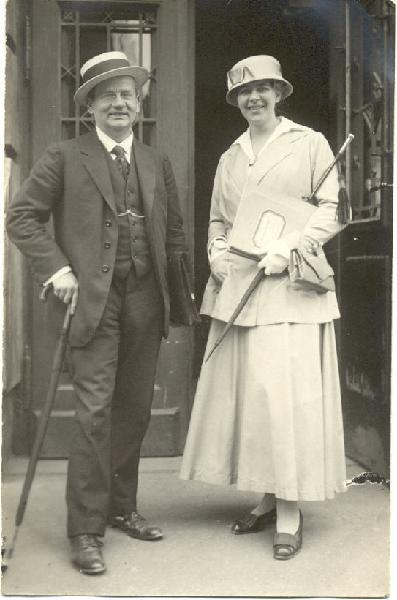Otto Wolf was born on November 7th, 1871 in Bernburg an der Saale. Wolf started as a violinist, already
playing in public when he was 9 years old. First Wolf undertook a business apprenticeship.
During a private concert, his voice was noticed, and he took his first lessons with Kammersängerin Wilhelme
Niehr-Bingerheimer. Subsequently, Wolf studied with the baritone Adolf Sondegg.
Wolf started his career in 1897 as Almaviva in Sonderhausen, where he was labelled an heldentenor!
In 1898, he was in Lübeck where he met the soprano Elisabeth Hölldobler, whom he
later married. (In 1894, Hölldobler was a Blumenmädchen in Parsifal in Bayreuth. This
was the closest Wolf was ever associated with Bayreuth.) During the first years of his career,
he sang as lyric tenor and light heldentenor; it wasn't until Munich that he was considered
a full-fleshed heldentenor. His wife was dramatic soprano in Freiburg while he was singing in Mainz, then in
Darmstadt (1901), where he sang: Chapelou, José, Tamino, Alfredo, Riccardo, Manrico,
and Turiddu. On May 1st, 1901, Wolf sang in Darmstadt in the world premiere of Gugeline (composer:
Ludwig Thuille). His next world premiere was, at the same theater, on
January 5th, 1902 in Der polnische Jude by Karel Zeiss.
His next big debut was as Lyonel in Munich on March 13th, 1907. During summer of 1907,
Wolf sang Froh at the Prinzregententheater in Munich. He left Darmstadt after singing
José on May 19th, 1909. In the same role, he made his debut as a member of the Munich troupe on
September 24th, 1909. First Wolf started to sing his standard repertory. During the summer
festival in Munich, he sang Froh and Junger Seemann (Tristan) in 1910. At the Residenztheater, Wolf sang
Tito (new production), Ferrando, Ottavio and Belmonte. Until 1912, Wolf sang
Max, Erik, Lohengrin, Rodolfo, Pinkerton, Faust, Raoul and Élézar,
and appeared in the world premiere of Franfreluche (composer Wilhelm Mauke).
He gradually switched to the heldentenor repertory, singing
Stolzing (1913) and Parsifal (1 and 21 June 1914). During the summer festival, he also sang Parsifal,
Froh and Stolzing.
After the First World War, the Munich summer festival reopened in 1919, and Wolf sang Tristan, Siegmund, and the
following year both Siegfrieds. For a big international career, Wolf was too old, had ventured into the heavy
heldentenor repertory too late – and German singers were only reluctantly hired after WWI outside Germany,
anyway. Finally in 1923, Wolf replaced Urlus as Tristan in
Amsterdam. This was followed by appearences in France, Italy, Denmark, Turkey and Spain. But
his big successes were in Germany; from 1922, he was Munich's first heldentenor, and only as such he was (and is)
remembered. In fact, though, his repertory was extremely varied, and comprised about 170 roles.
A lot more than Domingo.
In 1928, he sang for the first and only time in Buenos Aires. His last performance during
the summer festival was as Tristan (130 times in Munich) in 1929. On November 7th, 1934,
he sang Tannhäuser and retired. Largely forgotten, Wolf died on March 28th, 1946 in Munich.
